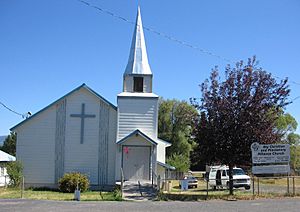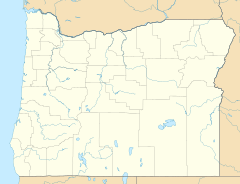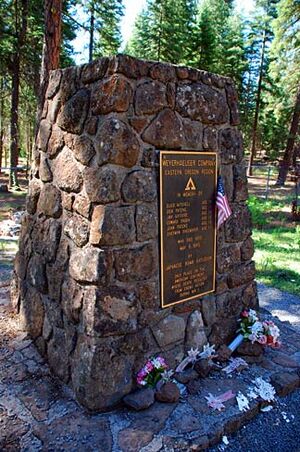Bly, Oregon facts for kids
Quick facts for kids
Bly, Oregon
|
|
|---|---|

Standing Stone Church of the Christian and Missionary Alliance
|
|
| Country | United States |
| State | Oregon |
| County | Klamath |
| unincorporated community | 1873 |
| Area | |
| • Total | 0.84 sq mi (2.19 km2) |
| • Land | 0.84 sq mi (2.19 km2) |
| • Water | 0.00 sq mi (0.00 km2) |
| Elevation | 4,360 ft (1,330 m) |
| Population
(2020)
|
|
| • Total | 207 |
| • Density | 244.97/sq mi (94.57/km2) |
| Time zone | UTC-8 (Pacific (PST)) |
| • Summer (DST) | UTC-7 (PDT) |
| ZIP code |
97622
|
| Area code(s) | 458 and 541 |
| FIPS code | 41-07150 |
| Historical population | |||
|---|---|---|---|
| Census | Pop. | %± | |
| 1910 | 100 | — | |
| 1920 | 100 | 0.0% | |
| 1940 | 800 | — | |
| 1950 | 800 | 0.0% | |
| 1960 | 600 | −25.0% | |
| 1970 | 500 | −16.7% | |
| 1980 | 750 | 50.0% | |
| 1990 | 750 | 0.0% | |
| 2000 | 486 | −35.2% | |
| 2020 | 207 | — | |
| source: | |||
Bly is a small, unincorporated community in Klamath County, Oregon, United States. An unincorporated community is a place that is not part of a city or town. Bly is located about 50 miles (80 km) east of Klamath Falls by highway. In 2020, about 207 people lived there. Bly is known for its beautiful natural surroundings and a unique part of World War II history.
Contents
Geography and Climate
Bly is found in the southeastern part of Klamath County. It is just west of Lake County. The community sits along Oregon Route 140. It is about 37 miles (60 km) west of Lakeview. It is also about 50 miles (80 km) east of Klamath Falls.
A stream called Fish Hole Creek flows through Bly. This creek joins the South Fork Sprague River just north of the community. The Fremont National Forest surrounds Bly on most sides. The Gearhart Mountain Wilderness is about 10 miles (16 km) northeast of Bly.
Bly's Climate
Bly has a climate with warm, dry summers. The temperatures are not usually very hot. The average monthly temperatures do not go above 71.6°F (22°C). This type of weather is called a warm-summer Mediterranean climate. On climate maps, it is known as "Csb."
History of Bly
The name Bly comes from the Klamath word p'lai. This word means 'up' or 'high'. It refers to Bly's location at the upper part of the Sprague River.
The first post office in the area was set up in 1873. It was called Sprague River. In 1883, its name was changed to Bly. At that time, Bly was close to the eastern edge of the Klamath Indian Reservation. Today, the community of Sprague River is downstream and west of Bly.
Around the year 1900, Bly was a busy place. It had two general stores, two hotels, and a saloon. A report from 1905 said that about 750 people lived in the surrounding area. The main products from the valley were cattle, horses, and mules. Farmers also grew oats, clover, and hay.
In 1935, the United States Forest Service bought land in Bly. They paid $625 for 4 acres (1.6 hectares). They built a district ranger station there. This station helped manage the western part of the Fremont National Forest. Workers from the Civilian Conservation Corps (CCC) built the station. The CCC was a program during the Great Depression that put young men to work. Seven buildings were built between 1936 and 1942. A new office building was added in the 1960s. The Bly Ranger Station is now listed on the National Register of Historic Places. This means it is an important historical site.
World War II Incident
Bly is also known for a sad event during World War II. On May 5, 1945, a Japanese balloon bomb exploded near Bly. This was the only time during the war that an enemy attack caused deaths in the continental United States.
A group of picnickers found the balloon bomb in the woods. They were curious and pulled it out. It exploded, killing six people. The victims were Elsie Mitchell (26), Edward Engen (13), Richard Patzke (14), Jay Gifford (13), Sherman Shoemaker (11), and Joan Patzke (13). Elsie Mitchell was the wife of minister Archie E. Mitchell. He heard the explosion and found the victims.
Today, there is a memorial at the site. It is called the Mitchell Recreation Area. It reminds people of this unique and tragic event in American history.
Parks and Recreation
The OC&E Woods Line State Trail passes through Bly. This trail is the longest linear state park in Oregon. It is about 100 miles (160 km) long. The trail was built on old railroad tracks. These tracks belonged to the former Oregon, California and Eastern Railway. This railway used to run from Klamath Falls to Bly.




